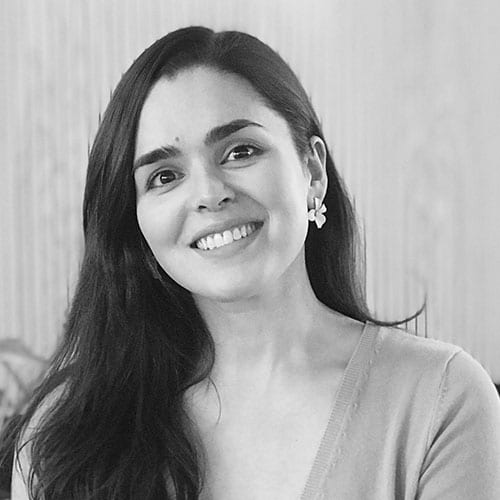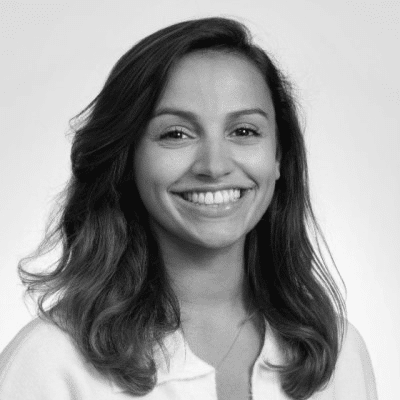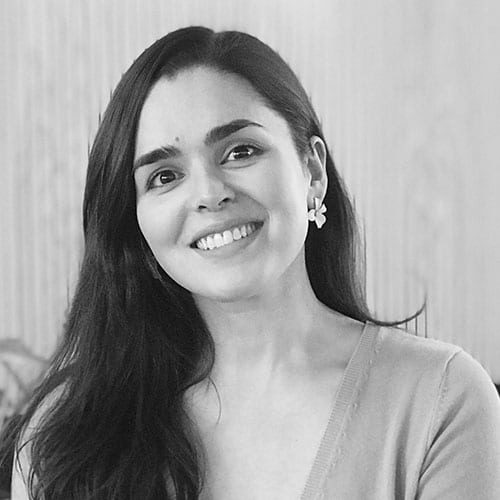With the explosion of GenAI and the power of this technology, there are ethical, environmental and social issues we just can’t ignore. We now have a responsibility to implement the technology responsibly for both our people and our planet.
Umbar Shakir is joined by Rosie Kitson, Chief Impact Officer at Havas, and Nicole Linney, Sustainability Consultant at Gate One, to explore the potential for us to use this technology to hack how we work. Their discussion focusses on the ethics of AI and how we should train these technology models, how GenAI tools can allow us to create less (but higher quality) content, and finally where the technology can play a key role in driving more sustainable solutions for a better world.

Umbar: It’s great to have you here today. We’re talking about the very exciting topic of sustainability and AI. I’ve got with me today Rosie, who is Chief Impact Officer at Havas, who are Gate One’s parent company, and I also have Nicole, who is a sustainability transformation consultant at Gate One

Nicole: Yeah, rolls off the tongue.

Umbar: And we’ll be talking today about the power of AI, but also the responsibility that comes with that power and how AI affects sustainability. But also, how we can implement AI in sustainable ways as well. So, really excited to explore that a little bit more. I want to maybe kick off with what I’m seeing. My clients come to me a lot around. So, initially, they start around what can I use AI for and the use cases, and then very quickly, we get into ethics, trust, responsibility. For anyone who’s played on some of these tools, they will know that there are inaccuracies in some of them.
It’s not magic, it’s just maths and very fast computing. And so, it’s only as good as the data that it’s trained on. And if we think about AI, AI has been around for yonks. It’s automation of human intelligence. And what’s been really exciting this year is with the rise of cloud computing and much, much more powerful computing power, we’re seeing that AI models are able to learn from vast amounts of data in large language models and synthesise new data, and that’s what’s really exciting people out in the market. What I’m seeing with clients though is that, with those inaccuracies and those biases, lots of questions around the data sets themselves. So, if we liken it to language, and we used to have to learn the language of computers and we used to have to code and learn their language, AI models are now learning our language and learning from the data sets that we provide it.
So, we have to do that in a responsible way. We have to teach the AI well. With data sets being so Western based, a lot of digital data is based in Western countries. There’s a lot of hypersexualization of women in digital media. Those biases start to come out. Whenever I put my picture in, I am a South Asian lady and slightly rotund, and it makes me a skinny white lady. But it does, it just does. So, those inaccuracies, and there are ways in which we can combat some of those things from a technical perspective. So, how we train those data sets, the AI models, and how we collate more data that’s more representative of the people who are using the AI. There’s ways around some of those inaccuracies and those biases.
We also start to see things around responsibility and trust. And fundamentally, I kind of feel like there’s a pivotal moment here where technology is so powerful. If we could wield it and harness it in the right way to actually serve people better and serve our planet better, that would be amazing. So, I’d love to sort of go to Rosie first, and given that context, Havas is an advertising agency network. How are you seeing AI being utilised across agencies and with your clients as well?

Rosie: Well, I think that’s a really interesting question. We talk a lot about the technical kind of functionality of AI. But one of the big questions is a human business decision, which is what is it used in service of? Is it to be deployed in service of more or is it to be deployed in service of better? So, in the context of advertising, more would mean using AI to essentially automate the process and churn out large volumes of advertising very cheaply, very quickly. Whereas using AI in service of better would be taking all of that amazing functionality and partnering with the creativity and strategic brains in our industry to make more engaging, better, more meaningful experiences. And we actually think that that results in being less advertising. And I think that no one’s ever asked, does the world need more advertising?

Umbar: But that’s quite punchy to come out and say… “Hey, let’s create less advertising!”

Rosie: But there are many signals that the world is asking for better advertising, and this is what we should be using AI to deliver. And I think that the knock-on value, down the value chain in marketing is enormous. So, you think about our media partners that host our advertising, they’re constantly trying to find that delicate balance between quality media environments and ad revenue. And if we are trying to use AI to create less but better quality advertising, that means less clutter, less interruption, more of the content that keeps our audiences coming back to these places that we need them to be consuming media so we can reach them.

Umbar: Spam doesn’t serve anyone.

Rosie: Spam does not serve anyone. But then, thinking about the audience, again, increasingly we’re seeing people turn on ad blockers or paying subscription fees for ad-free content environments. So, we need to be trying to cater to their needs. How can we make less but better quality experiences? Again, less intrusion, less interruptions in their lives. But that means that their reaction, their response to our messages when they get through are better and are more meaningful. And I think that kind of, the consequences of these seem very obvious, but the upfront decision-making process isn’t, and we need to be supporting our clients with that. What are the frameworks that support that decision-making process in service of better rather than more?

Umbar: And I love that whole piece around better. We talk about effectiveness as well as efficiency.

Rosie: Absolutely

Umbar: And so many times, our clients come to us and say, “I want to drive productivity gains,” or, “I want better efficiencies.” And we kind of go, “Well, maybe there’s a better exam question here, which is how would you free up that capacity not just to get rid of heads out of the organisation, but to solve for bigger and better problems in the world?”

Rosie: And I think if you think about the amazing creative and strategic talent that our industry is lucky enough to attract, so much of that head space is used on really mundane tasks. So, how can we automate those mundane tasks, free up that brainpower to be solving the bigger problems, solving some of the issues and advertising which is making people are trying to ignore it, how do we make those experiences more meaningful? And then, combine that with the increased analytical ability of AI to make that more effective, that we have a better industry that people want to be part of, and that’s important.

Umbar: And there’s a parallel in what Rosie’s saying with some of what sustainability experts are feeling in their function and roles as well, just around that drudgery and mundaneness.

Nicole: I think, absolutely. I don’t think there’s a single sustainability professional that you’re talking to at the moment that isn’t saying, “My head space is completely taken up by all of the reporting and the compliance that I need to do now,” let alone into the future as we get more and more regulatory frameworks coming in around environmental, social and governance data as well. That piece on sustainability experts, their craft is really the passion and the availability of time to say, “This is how we need to perform better as a company. This is how we need to move the needle in terms of change and progress and better.” But actually, the majority of their time is taken up just on those tick box exercises. And so, they’re doing a lot of the graft, and they don’t have a lot of time for craft at all. And if you think about one of the frameworks that’s coming in around the CSRD, over 1,000 data points have to be captured for up to 50,000 different companies.
If you think one person in each of those 50,000 companies is going to be responsible for inputting all of that data, could you imagine how much time that’s going to take? And there’s going to be duplication of all of the data that goes into it because people need to think about their supply chains and their supply chains are actually somebody else’s supply chain. So, you’ve just got masses amounts of people putting time and effort into things that are not necessarily driving change and driving value back into, A, the business, and driving value back out into society. So, how can you really think about using things like AI to take out some of that drudgery, to take out that graft and really give people the space in the creative world, in the sustainability world, in everyone’s jobs, really, to start saying, “What can I do with my craft if I give AI the graft?”

Umbar: And that’s fascinating because there’s almost like this virtuous cycle of, I do get asked quite a lot about the impact of technology from a carbon footprint perspective and the energy consumption perspective. But actually, what if we were to utilise AI to actually have less of that carbon impact if we could take the drudgery out and we could maybe get smarter in that data collection piece as well? So, there’s almost AI helping sustainability professionals, but then also some business choices. And I loved what you said at the beginning of your, sort of talking about how agencies are being impacted, that the businesses have a choice in terms of how we wield the technology and whether we use it to create more with the same or less with the same or less overall. There’s something around that in how we implement technology as well. So, when our clients come to us and start to talk about, “Well, how do I bring AI infrastructure into my organisation?”
We talk to them about, “Actually, you might want to clear up your data debt.” A lot of organisations, for many years we’ve been talking about the quality of their data or poor data, and there’s not been that burning platform to fix that. And I feel like there’s something about offsetting terabytes of data storage before you actually then embark on some of your AI initiatives to bring more consumption into the landscape. And how do we make sure that we make those sustainable choices and use AI for sustainability as well? So, that hand in hand. I think I heard that, maybe even from Unicar, that there is a data platform globally that is being set up, or is it an EU wide initiative? Tell us more.

Nicole: Yeah. So, it’s European single point of access where essentially all of the CSRD reporting will need to be tagged onto this system, right? But again, if you’ve got a global system with 50,000 companies’ data points, let’s say, on it, that is just a system to tick a box, right? It’s not necessarily doing the process of then saying, “All of this information, the interesting parts that you as a user of the information,” an investor for an example, “This is all the stuff that you need to know about. This is what’s changed year-on-year.” It’s just a platform. So individually, you’re going to have multiple companies, multiple users of this information, downloading it, trying to understand it, doing the analysis. And at the end of the day, we’re only a function of how much computing power we have in our own brains versus what we would actually be able to do with AI.
And actually being able to say, “Pause. What’s the bigger picture here? And how can I read that from what AI has already told me?” Rather than each person doing that themselves, each time over, you start to get to a point of saying, “This is a global problem. Sustainability and how we make a better world and a better society is a global problem.” So, how about we use the information to kind of create a bit more of a global solution so that we are all consistent and aligned? I think there’s so much to be said about what we need to do beyond that point of collecting the data. And too often with our clients at the moment, it’s, “Help me collect the data, help me understand how I’m going to be able to report on it.” Not, “Help me understand how I can use the data, help me understand how I can drive that back into my business.”

Umbar: It feels very tactical almost, like you said, if it’s a global problem, it’s not for one corporation to solve. So, one corporation doing the reporting, I kind of draw an analogy with the World Health Organisation and that crowdsourcing of global health data and how that lifts health indicators for the world. What’s the equivalent of that? And maybe this data platform might be the beginnings of that, but what do you…

Nicole: Absolutely. Yeah, not to poo poo on it at all. It will be a fantastic point of all of this information being consistent and being standardised. But there’s just so much to be said beyond just how do I get my data onto that platform, and really moving beyond the fact that sustainability in the last kind of 10 to 20 years has gone from being something interesting to being something that is a cost and compliance led piece. And AI currently has the sexy innovation sort of theme. How do we get sustainability back into that realm? Because it shouldn’t just be cost and compliance, it should be about value creation. It should be innovative and sexy in its own right because it’s doing something better for companies and for the world and for society. Why is it getting this bad name, really?

Rosie: I think that’s a really nice point because there’s a lot of focus on, obviously for regulatory reasons, business are really focusing on reporting, but there’s that sense that AI is competing for that leadership head space, and we shouldn’t be thinking either AI or sustainability. We should think about how do these work together?

Nicole: 100%

Rosie: Because actually, they’re really going to unlock the kind of transformational change that we need to be seeing in the next sort of 5, 10 years.

Umbar: Absolutely. And if AI could help us hack how we do our work and how we live our lives, we might actually have a chance of not just collecting the data about it, but actually shifting the needle on the performance of what it’s going to take for us as a society to save the planet. I mean, it sounds really worthy and noble. But fundamentally, I’m just like, “Oh my God, what an opportunity.

Nicole: But it is fundamental, isn’t it? It is a fundamental task that we need to be able to do. And so, at the end of the day, if you can create the head space in marketing and in creatives and in finance and in risk and in sustainability so that not everyone at crunch time is saying, “I can’t talk to anybody else because my head’s in data, my head’s in the annual report, my head’s in this. Actually, my head is in being able to talk to all of the different functions about what we’re doing, why we’re doing it, how we’re doing it, and how we do it better.” And at the end of the day, at the moment, there’s so much kind of resource constraint and capability constraint that no one’s able to do that in one team, let alone across teams. So, realistically, we need to find ways to free up people’s space. Not to get rid of jobs, not to get rid of kind of tasks and complications, but to actually free up their time.

Rosie: Yeah. Well, I just thinking about working in silos, and because people are so time-poor and really, really stretching every single hour of the day, they can’t. Collaboration requires a real upfront investment in time and people don’t have that time. And just like the digital transformation, we can’t do this in silos. We all have to work together, and not only in businesses but across businesses and that sort industry-wide collaboration, probably even cross-industry-wide collaboration.

Nicole: Definitely

Rosie: It’s the level of thinking we need to get that big step change.

Umbar: And I can’t help but feel that that responsibility and those ethics start with us in the room.

Rosie: Absolutely

Umbar: It starts at our client conversations, your client conversations, being that provocation in the market to be a bit of a voice of reason because the regulatory policymakers are just too far behind where the technology is. So, what are those choices that we can start to really provoke in our clients, in our organisations, with our colleagues, and just generally across the world? And I do feel like this technology, while it’s very powerful and it can have lots of implications, can really be wielded by making the right choices, by having some ethical frameworks and the right intention to take our problem-solving upper level, to not be in the tactical but in the more strategic.

Nicole: Absolutely.

Umbar: We’ve actually got a chance to really make a difference on sustainability.

Rosie: I reckon so.

Umbar: Thank you so much for all of your inputs. It was a really good conversation. Really great.

Nicole: Absolutely.

Rosie: Yeah. No, fantastic. Thank you.


At Gate One, we are proud to work alongside our colleagues in Havas to help businesses deliver better, more sustainable outcomes. Sign up to our AI content to stay on top of the latest AI thinking and help ensure your business is crafting meaningful outcomes from this new wave of technology.


